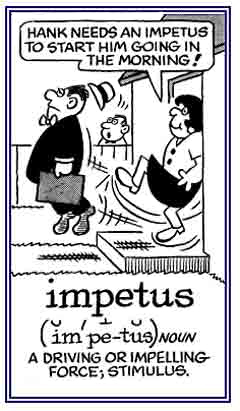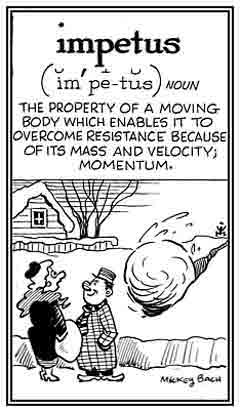peti-, pet-, -pit-
(Latin: to aim at, aim for, go toward; to seek, seek out, ask, request; strive after)
impetuously (adverb), more impetuously, most impetuously
A reference to doing something without being careful or cautious.
1. A coercion that moves something along, an impelling compulsion or an impulse to get something done: The discoveries by the biologist have given impetus to others to do further research.
2. The act of applying power suddenly or an increased activity in response to a stimulus: The series of auto accidents have become the impetus for developing better highways in the area.
3. The energy or motivation to accomplish or to undertake an objective: David's devotion and guidance have provided the primary impetus to complete the educational project.
4. In physics, an energy that causes the motion of an object to overcome resistance and to maintain its velocity: A force that starts a body to move, or which tends to resist changes in its speed or direction once it is moving, is the impetus for learning more about how physical movements can be controlled.
5. Etymology: from Latin impetus, "attack, assault, onset, impulse, violence, vigor, force, passion"; related to impetere, "to attack"; from in-, "into" + petere, "to aim for, to rush at".

© ALL rights are reserved.

© ALL rights are reserved.
Go to this Word A Day Revisited Index
2. The act of applying power suddenly or an increased activity in response to a stimulus: The series of auto accidents have become the impetus for developing better highways in the area.
3. The energy or motivation to accomplish or to undertake an objective: David's devotion and guidance have provided the primary impetus to complete the educational project.
4. In physics, an energy that causes the motion of an object to overcome resistance and to maintain its velocity: A force that starts a body to move, or which tends to resist changes in its speed or direction once it is moving, is the impetus for learning more about how physical movements can be controlled.
5. Etymology: from Latin impetus, "attack, assault, onset, impulse, violence, vigor, force, passion"; related to impetere, "to attack"; from in-, "into" + petere, "to aim for, to rush at".


Go to this Word A Day Revisited Index
so you can see more Mickey Bach illustrations.
in perpetuum
Forever, in perpetuity.
Often seen on tombstones. Also presented as in perpetuo.
1. The lack of physical or intellectual ability or qualifications to succeed with a project.
2. The quality or situation in which a person is lacking a qualification or an ability to do something; incapable; inadequate for or unsuited for a particular purpose or application.
3. Etymology: from French incompétence, from in-, "not, opposite of, without" + compétence, from competens, competere, "to strive in common"; in classical Latin "to come together, to agree, to be qualified"; later it came to mean, "strive together"; from com-, "together" + petere, "to strive, to seek, to fall upon, to rush at, to attack".
2. The quality or situation in which a person is lacking a qualification or an ability to do something; incapable; inadequate for or unsuited for a particular purpose or application.
3. Etymology: from French incompétence, from in-, "not, opposite of, without" + compétence, from competens, competere, "to strive in common"; in classical Latin "to come together, to agree, to be qualified"; later it came to mean, "strive together"; from com-, "together" + petere, "to strive, to seek, to fall upon, to rush at, to attack".
incompetent (adjective), more incompetent, most incompetent
1. Descriptive of not being qualified in legal terms: "As a defendant, he was incompetent to stand trial."
2. Lacking the skills, qualities, or ability to do something properly.
3. Devoid of those qualities which are necessary for an effective conduct or action.
4. Etymology: "insufficient", from French incompetent, from Late Latin incompetentem; from in-, "not" + Latin competentem, competere, "to coincide, to agree"; from com-, "together" + petere, "to strive, to seek, to fall upon, to rush at, to attack".
2. Lacking the skills, qualities, or ability to do something properly.
3. Devoid of those qualities which are necessary for an effective conduct or action.
4. Etymology: "insufficient", from French incompetent, from Late Latin incompetentem; from in-, "not" + Latin competentem, competere, "to coincide, to agree"; from com-, "together" + petere, "to strive, to seek, to fall upon, to rush at, to attack".
incompetently (adverb), more incompetently, most incompetently
A reference to not having nor showing the necessary skills to do something successfully.
mental competence
The ability to perform cognitive functions; such as, thinking, comprehending, deliberating, and judging in accordance with a person's age and training.
1. An increasing desire or urge to put everything aside (at work, while reading, or whatever) in favor of a quick nap.
2. An instinctive physical desire, especially one for food and then a nap.
3. A sudden, uncontrollable desire to take a nap, which often occurs just after having a snack.
4. A term for someone who dreams about food while taking a nap.
5. Etymology: nap-, from Old English hnappian, "to doze, to sleep lightly" + [ap-] petite, from Latin appetitus, "appetite"; literally, "to strive for" or "desire for"; from appetitus, past participle of appetere, "to long for, to desire"; from ad-, "to" + petere, "to go to, to seek out, to aim for".
2. An instinctive physical desire, especially one for food and then a nap.
3. A sudden, uncontrollable desire to take a nap, which often occurs just after having a snack.
4. A term for someone who dreams about food while taking a nap.
5. Etymology: nap-, from Old English hnappian, "to doze, to sleep lightly" + [ap-] petite, from Latin appetitus, "appetite"; literally, "to strive for" or "desire for"; from appetitus, past participle of appetere, "to long for, to desire"; from ad-, "to" + petere, "to go to, to seek out, to aim for".
Together they usually mean, "a strong desire for a short period of sleep sometime during the day" in addition to a regular night's sleep. This, of course, depends on whether a person must work a night shift or has a regular day-time schedule.
perpetual (adjective) (not comparable)
1. Something that is occurring so frequently as to seem to be continuing forever or for a very long time without stopping: "Theodore seems to have a perpetual grin on his face whenever you see him."
3. A description of flowers or flowering plants that bloom throughout the season: "Madeline has perpetual carnations and other flowers in her green house."
4. Etymology: from Old French perpetuel, from Latin perpetualis, "universal"; in Medieval Latin, "permanent", from perpetuus, "continuous, universal"; from perpetis, genitive (expressing "possession" or "origin") of Old Latin perpes, "lasting"; probably from per-, "through" + root of petere, "to seek, to go to, to aim at".
"With the economic slowdown, many people are in perpetual debt."
"It seems that there is a perpetual suffering for too many poor people in the world."
2. Uninterrupted in time and continuing indefinitely or happening all the time or very often: "The perpetual demands of parenthood can be very stressful at times."3. A description of flowers or flowering plants that bloom throughout the season: "Madeline has perpetual carnations and other flowers in her green house."
4. Etymology: from Old French perpetuel, from Latin perpetualis, "universal"; in Medieval Latin, "permanent", from perpetuus, "continuous, universal"; from perpetis, genitive (expressing "possession" or "origin") of Old Latin perpes, "lasting"; probably from per-, "through" + root of petere, "to seek, to go to, to aim at".
perpetual motion
1. The action of a moving device which requires no input of energy to maintain it, and so it can continue operating indefinitely.
2. In thermodynamics, the unproven theory that when a machine produces work, it can continue to operate for an indefinite time solely by the use of its own energy.
2. In thermodynamics, the unproven theory that when a machine produces work, it can continue to operate for an indefinite time solely by the use of its own energy.
Various supposed perpetual motion machines have been described in the past before a valid understanding of the laws of thermodynamics became accepted.
perpetually (adverb) (not comparable)
1. Forever, for a very long time, or everlastingly; for all time.
2. Repeatedly at very short intervals, and so appearing to be continuous.
2. Repeatedly at very short intervals, and so appearing to be continuous.
1. The act of prolonging something.
2. Continuing or continued without intermission or interruption; ceaseless.
2. Continuing or continued without intermission or interruption; ceaseless.
perpetuate (verb), perpetuates; perpetuated; perpetuating
1. To make something; such as, a situation or process, to continue, especially something that is wrong, unfair, or dangerous: "The current economic policy that is being proposed by the politicians only serves to perpetuate the divide between the rich and the poor."
2. To cause something to continue indefinitely; to make a situation perpetual.
3. To prolong the existence of; to cause to be remembered: "Building the new library will perpetuate the resources needed for people to enhance their learning." 4. To preserve or make testimony available for later use at a legal trial by means of deposition; especially, when the evidence so gathered would be otherwise unavailable or lost.
5. To preserve from extinction or oblivion.
2. To cause something to continue indefinitely; to make a situation perpetual.
3. To prolong the existence of; to cause to be remembered: "Building the new library will perpetuate the resources needed for people to enhance their learning." 4. To preserve or make testimony available for later use at a legal trial by means of deposition; especially, when the evidence so gathered would be otherwise unavailable or lost.
5. To preserve from extinction or oblivion.
1. The act of prolonging something or to cause it to last indefinitely.
2. The act of preserving from extinction through an endless existence or for an indefinite period of time; a continuance.
2. The act of preserving from extinction through an endless existence or for an indefinite period of time; a continuance.


